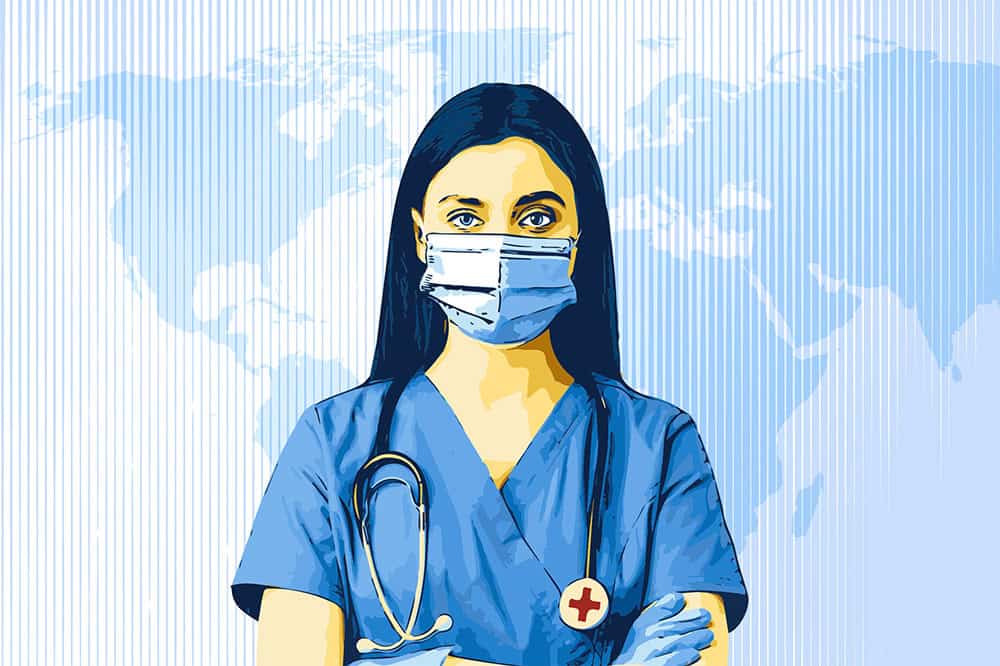Healthcare Costs for Americans Projected to Grow at an Alarmingly High Rate
Last Updated May 1, 2019
The Centers for Medicare and Medicaid Services (CMS) recently published updated projections on national healthcare spending, detailing the rapidly rising cost of some of our most important healthcare programs. The projections from CMS indicate that total healthcare spending in the U.S. will continue to grow at an alarmingly high rate.
Healthcare Costs Continue to Rise in the U.S.
Overall healthcare costs — including all private and public spending — are anticipated to rise by an average of 5.5 percent per year over the next decade — growing from $3.5 trillion in 2017 to $6 trillion by 2027. Healthcare spending is projected to grow faster than the economy, increasing from 17.9 percent of gross domestic product (GDP) in 2017 to 19.4 percent of GDP in 2027.
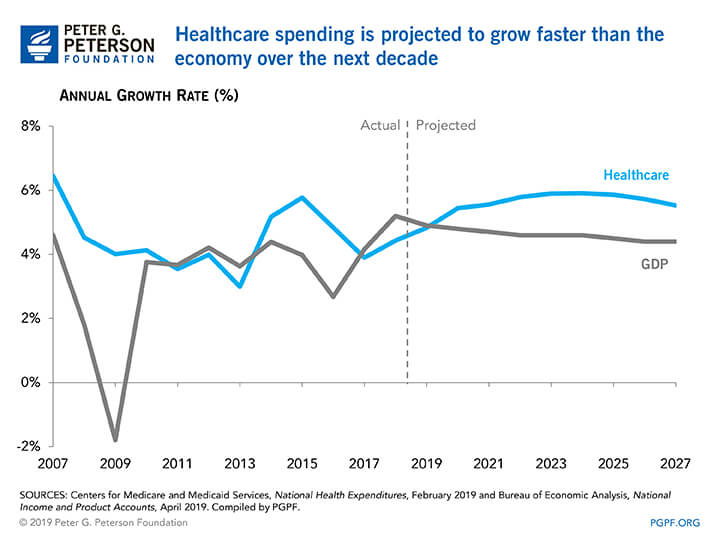
Government Healthcare Programs are Growing at a Rapid Rate
Major government healthcare programs such as Medicare and Medicaid are the fastest growing components of healthcare spending. Over the next decade, Medicare is expected to grow at an average annual rate of 7.4 percent and Medicaid is expected to grow at an annual rate of 5.5 percent. Private health insurance, meanwhile, is expected to grow by 4.8 percent a year. Altogether, the cost of government health insurance programs is projected to nearly double in the next 10 years — climbing from $1.4 trillion in 2017 to $2.6 trillion in 2027. As a result, government healthcare programs will account for about 44 percent of total healthcare spending in the U.S. economy by 2027.
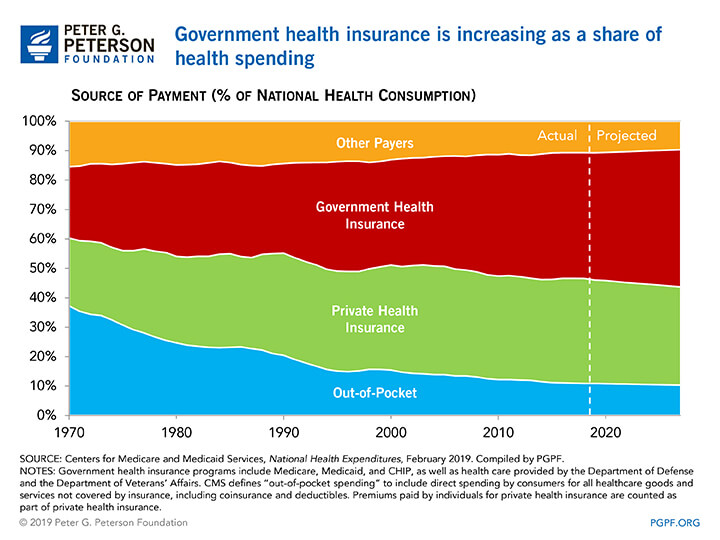
All Components of Healthcare Spending Will Outpace their Recent Growth
The different components of healthcare expenditures are also projected to climb at exceedingly high annual rates over the next decade, especially when compared to growth rates from 2012 to 2017. For example, hospital care — the largest component of national health expenditures — is anticipated to grow at an annual average rate of 5.6 percent over the next decade, which is above its recent five-year average growth rate of 5 percent. This seemingly small difference can have a significant impact. If hospital care expenses grew at a rate of 5 percent over the next decade rather than 5.6 percent, the resulting savings would be $97 billion. Prescription drug spending — one of the fastest growing components of healthcare expenditures in the U.S. — is also expected to rise, on average, by 5.6 percent annually in the next 10 years as opposed to a 4.4 percent average annual growth rate in the previous five-year period. In fact, each major component of healthcare expenditures is projected to grow at a faster rate in the next decade than it has in the past five years.
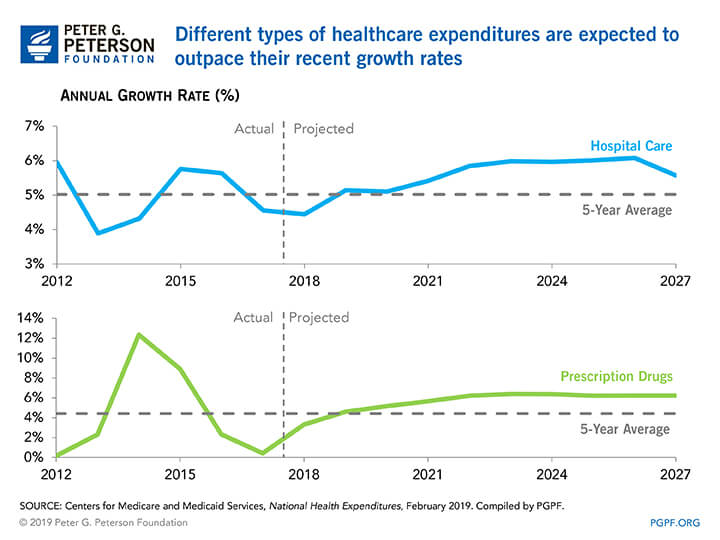
What’s Causing This Rapid Growth in Healthcare Costs?
This rapid growth in healthcare costs can largely be attributed to two factors: rising healthcare prices and an aging population. Prices for healthcare goods and services are expected to grow faster than they have in the past. CMS projects that healthcare prices will grow at an average annual rate of 2.5 percent over the next decade compared to a 1.3 percent annual growth rate from 2012–2017.
Our aging population also contributes to these growing costs as individuals age 65 and older spend, on average, three times more on healthcare per person than working-age individuals and five times more than children. Furthermore, according to the U.S. Census Bureau, the population of individuals age 65 and over is expected to increase by 16 million over the next decade while the under-65 population will only increase by 5 million.
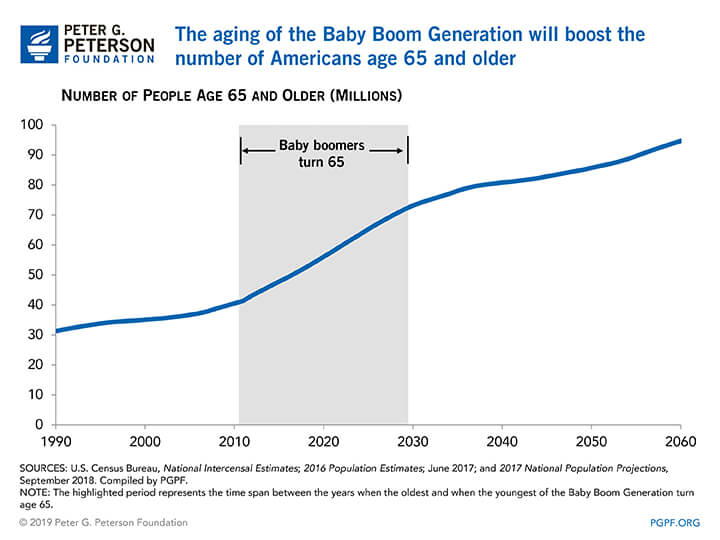
Despite already having the most expensive healthcare system in the world, healthcare costs in the U.S. are expected to continue to grow in the future. High healthcare costs can be detrimental to an economy’s well-being, reducing the amount of resources that our nation and families have to invest in our future. Improving our healthcare system and lowering its costs is vital to our country’s fiscal and economic well-being.
Image credit: Photo by Getty Images
Further Reading
How Does Government Healthcare Spending Differ From Private Insurance?
Government insurance programs, such as Medicare and Medicaid, made up 45 percent, or $1.9 trillion, of national healthcare spending.
7 Key Facts About Rising Healthcare Spending in the U.S.
Healthcare spending in the United States is a key driver of the nation’s fiscal imbalance and has risen notably over the past few decades.
Infographic: U.S. Healthcare Spending
Improving our healthcare system to deliver better quality care at lower cost is critically important to our nation’s long-term economic and fiscal well-being.


